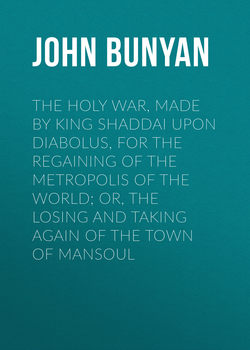Читать книгу The Holy War, Made by King Shaddai Upon Diabolus, for the Regaining of the Metropolis of the World; Or, The Losing and Taking Again of the Town of Mansoul - John Bunyan - Страница 1
PREFACE
ОглавлениеIn the year 1682 there was published by Dorman Newman, ‘at the King’s Arms in the Poultry,’ and Benjamin Alsop, ‘at the Angel and Bible in the Poultry,’ a volume entitled ‘The Holy War, made by Shaddai upon Diabolus for the regaining of the Metropolis of the World; or the Losing and Taking again of the Town of Mansoul.’ It was the work of John Bunyan, who, sixteen years before, had published the story of his own spiritual struggle under the title of ‘Grace abounding to the Chief of Sinners’;and, but four years before, had produced ‘The Pilgrim’s Progress’ (Part I). Bunyan had speedily followed the issue of the ‘Pilgrim’s Progress’ with the ‘Life and Death of Mr. Badman,’picture of English life and character as he had seen it, grimly faithful to fact. In ‘The Holy War’ Bunyan returned to allegory. As a piece of literature the book is in no way inferior to the ‘Pilgrim’s Progress.’ If Bunyan had written nothing else, ‘The Holy War’ would have sufficed to establish his claim to a place amongst the masters of English prose. As an appeal to the conscience it is not a whit less effective than the ‘Pilgrim’s Progress’; but in the power of seizing and retaining the reader’s attention it is scarcely so successful. Nevertheless Macaulay held that ‘if there had been no “Pilgrim’s Progress” “The Holy War” would have been the first of religious allegories.’
In working out the details of ‘The Holy War’ Bunyan seems to have kept in mind his own experience. The fortifications of the city, the movements of the opposing forces, the changes in the municipal offices of Mansoul were reproductions of scenes and events that had but recently gone on under Bunyan’s eyes. He adapted them with extraordinary success to the presentation both of the doctrines of grace and of the temptations which attend the Christian life. The characters and the incidents are, in effect, the characters and incidents of every age. It is this which gives to the story of Mansoul its undying freshness, and suits it to the needs of men in all climes. ‘The Holy War’ has been translated into many languages, including some of those with the scantiest of literature. Indeed, as this edition is being prepared for the press, assistance is being rendered by the Religious Tract Society in the printing of ‘The Holy War’ in Kongo.
A. R. BUCKLAND.
